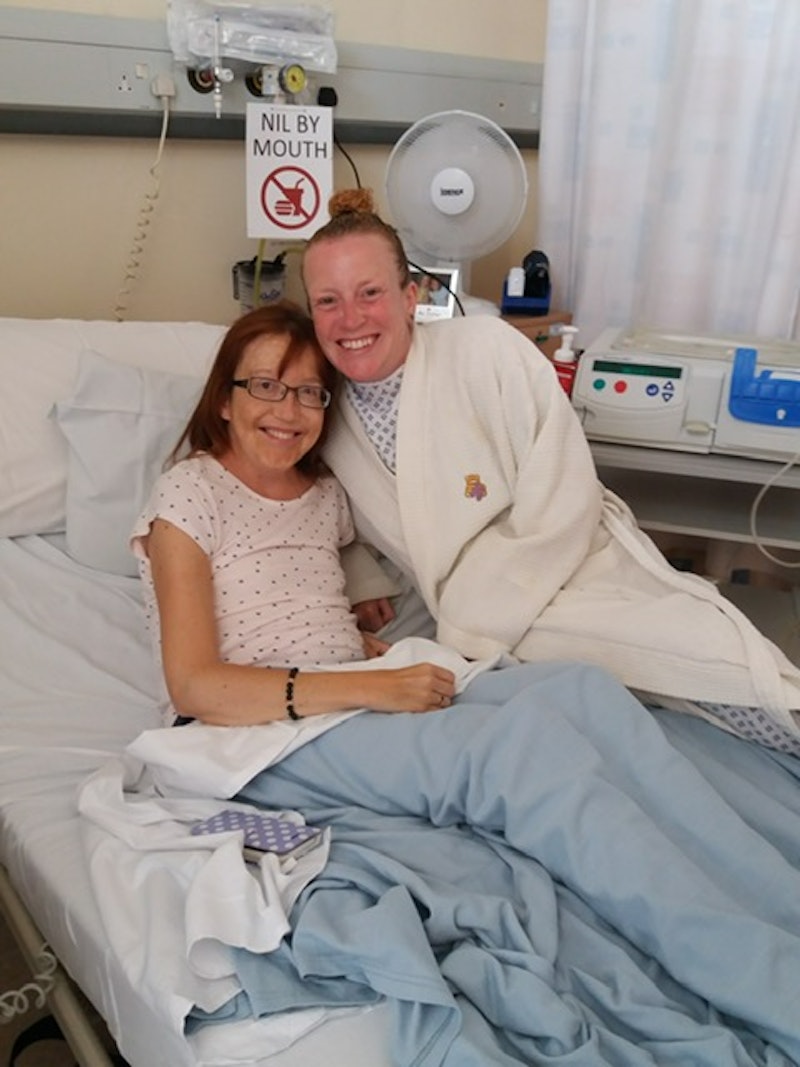Enrichment
Organ Donation Week: Natasha's Story

21st September 2023
This week is Organ Donation Week, a week-long campaign that takes place every year, with the aim of raising awareness about the ongoing need for organ donors. The more people that understand the need for and importance of organ donation, the more people who register their decision to become organ donors after they die, and the more lives that can be saved.
In recognition of this, we have a special two-part blog to share with you. Today we will hear from Natasha Rogers. Natasha was born with heart disease, which was diagnosed as Eisenmenger Syndrome.
Eisenmenger Syndrome is characterised by a hole in the heart, high blood pressure in the pulmonary arteries in the lungs and a blue appearance known as cyanosis. Throughout her childhood, Natasha experienced the symptoms of this syndrome, such as cyanosis, breathlessness, tiredness, headaches, chest tightness and numbness and tingling of the fingers and toes.
In her early 20s, Natasha became very unwell and was put on the transplant waiting list for a donor heart and lungs. This is Natasha’s story.
My Story
By Natasha Rogers
My mind goes back to 22 years ago. My health had been deteriorating rapidly and doctors had recently given me about two weeks to live if I didn’t get a transplant.
At about 7.30pm on Mon 25th June 2001 we get a phone call, something like this: “Hello, this is Harefield Hospital here. Just ringing to let you know that a heart and lungs has just become available and could be suitable for Natasha."
At first we all think it is a ‘wind up’ but who would try to wind us up like that? We get home and try to get things sorted out. Care for the Dog. Work. Family. Close friends. We are soon on the M1 and mum’s phone is ringing constantly. People wishing us well.
We get to Harefield and I undergo various tests and the plan was to get to theatre at about 11.00pm. Well, that came and went. It’s then 1.00am. Nothing!! It’s then 3.00am! Nothing. Then 5.00am still nothing. Obviously, with all these delays, they all began to wonder if the transplant would ever happen. We were told of a problem with the organs, but not what or where the problem was. All through the night, while they had been pacing up and down the corridors, waiting patiently, I was out of it sleeping. I vaguely remember my sister Hayley telling me of the good times and holidays we had shared together as a family, and to look forward to more of them once I was better.
Many transplant patients get these 'false alarms' when at the last minute the transplant is cancelled but at 6.45am the co-ordinator tells us that everything is OK and that “we’re on.” At that point you don’t have time to even think. The porter came in and we ran down the corridor to the theatre. At the door, my family were given 30 seconds to say any special words to me. The door closed and I was in theatre, alone without my family.
Well, that day was a very, very long day for everyone. It had been a very tiring night and not something that we would want to go through again. My operation lasted nearly eight hours and after sitting outside ITU (intensive therapy unit) for what seemed ages, mum and dad were let in to see me. I don’t remember much but I’m told I was hooked up to machines, drips and ventilators. Alarm bells were ringing and it was very scary indeed. The first thing that struck dad was my pink fingers! I had always had the blue tinges to my fingers and lips but now they were PINK!
I spent five weeks recovering slowly in ITU and then another eight weeks on the ward, gradually building up my strength. Finally, I was allowed home and now my recovery could really start. I was on lots of different medications throughout the day, but I knew they were all to help keep my alive. We were warned that the ‘anti rejection’ medications can cause problems for other organs. The kidneys were mostly at risk but this is different for each person. It could be a problem in 5, 10, 15, 20 years or maybe not at all. It was great to have this ‘extra’ energy and I found myself taking part in things that once, I could only dream of.
Looking back, the highlight would probably be representing Harefield Hospital in the British Transplant Games. I had never had the energy as a youngster to do sports and running was definitely out of the question. Talking to other transplant recipients, I decided to sign up for the 2013 games in Sheffield. The whole occasion was a terrific experience. I met up with all sorts of transplant recipients from all over the world and it was lovely to share stories with many of them. I took part in tenpin bowling and Cricket Ball Throwing. To my amazement I won a GOLD medal in the ball throwing event for my age. I was so excited and on a high.
My kidney function started to go downhill but very gradually. I was regularly tested, but the decline was still very slow. Then the signs were that things were declining more rapidly. Dialysis and kidney transplant were talked about. My kidney function just seemed to stay above the ‘danger’ levels. They were hoping to keep me off the dialysis route for as long as they could.
During 2018 my condition was still deteriorating and the thought of dialysis was not high on my list. My dad was tested to be a suitable living donor for me. He passed the first series of tests but then his own kidney function was found to be not quite sufficient to warrant being a donor for me. He was absolutely devastated. As my dad, he just wanted me to be able have as normal a life as possible. But it was not meant to be.
My younger sister, Hayley, put herself forward as a potential donor. She had intensive tests at Leicester General Hospital and passed them all. Hayley has two boys and they were aged 15 and 11 at this time. She has a very responsible job at Northampton General Hospital, as part of the Practice Development Team that teaches End of Life Care to the staff, so this was a massive commitment from her. My parents and I cannot express how much indebted to her we are for this precious gift she was giving to me. It had been a long struggle, but now we could almost see the light at the end of the tunnel.
Meanwhile, my kidney function had deteriorated again. It was now around the 6-8% levels and I was constantly tired and could not get about much at all. I was given training for peritoneal dialysis. I was trained for ‘manual’ dialysis at first and then we were supplied with a machine for me to use at night. It was rather complex to learn, but I coped very well, much to my amazement. Each night I connected myself to the bags of fluids and the machine did the rest. There were different strengths of fluid and I had problems with water retention in my legs. Different bags were used and now, we were getting good results.
Both Hayley and myself had to be interviewed by the Human Tissue Authority, which is an important part of the process of living organ donation. Providing this ticked all the right boxes, the transplant was planned to go ahead at Leicester General Hospital on Thurs 25th July 2019, just 18 years and one month after my heart and lung transplant. With my heart and lung issues, the hospital were rather concerned. They had never performed a kidney transplant on a heart and lung recipient, so they needed to ensure that I had an ITU bed following the transplant, which as with all hospitals, is not guaranteed.
The day of my second transplant came and it was very strange to be in hospital with my own sister. They took Hayley down to theatre at 8.30am and the removal of her kidney took about 4 hours. I was taken down about lunch time and Hayley’s kidney was transplanted into my body. I spent the night in ITU but everything went very smoothly and I didn’t need any extra care.
The last 12 months have been rather difficult, in that my blood levels have been giving the hospitals some concern. Harefield Hospital have found that I have required a higher level of medication for my heart and lungs. Unfortunately, this has had an adverse effect on my new kidney and it has taken lots of medication alterations and blood tests, to get to the level that is acceptable to both hospitals. So, now I am a member of a VERY elite club, having three new organs in my body, but determined to look after all three and live life to the full.
I am forever grateful to my donors and acknowledge the precious gifts that I have been given.


You can learn more about organ donation on the NHS Blood and Transplant website.
You might also like

How eye health can indicate blood pressure issues
23rd August 2022

Bradford on Duty: Tackling health inequality and social issues
30th August 2022

Air pollution and lung cancer: New discoveries
20th September 2022

The dangers of black mould
21st November 2022

Stoptober
3rd October 2023